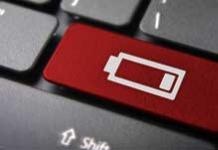Not every person in the process of choosing a laptop computer is able to accurately determine how reliable the model that interests him is. Someone relies on the “maybe” inherent in many. And some are openly deceived by the “expert opinion” of the sales consultant. In the end, each of us has our own opinion on what exactly a mobile device should be. Nevertheless, due to our ignorance, and, as often happens, filled and driven by the momentary desire “I want it - that’s it!”, we tend to commit rash actions. You may not agree, dear readers, but for the most part we ourselves are the culprits of the unpleasant situation when the laptop turns off by itself.
However, as they say, every cloud has a silver lining! Therefore, let's cheer up and try to solve the problem that has been voiced, which, for your information, may be far-fetched. To know for sure, you just need to devote a few minutes of your precious time to reading the material below. Who knows, maybe the expert in you will awaken, and the experience gained will become a starting point into the fascinating world of electronics.
Instead of an introduction: a little about trade secrets
Rejoice, owners of budget modifications! Since the generally accepted statement that a cheap laptop is an extremely unreliable technology, in fact, oh, how far from the truth! And the current situation in the computing device market is great proof of this. Competition is a great helper for the practical user. Well, the mentioned trick “the laptop turns off by itself” is also inherent in branded electronics. By the way, the last option is the most difficult in terms of repair maintenance.
So, about the secrets of manufacturers... One way or another, making reliable laptops is a matter of the future. Unfortunately for some and fortunately for some, this is indeed the case! Budget modifications are often equipped with the same parts as expensive ones, but in a stripped-down version. A cooling system of any design “cannot live without dust.” Well, the “packed power”, constrained by the ultra-thin body, is still prone to overheating. On top of that, the technology of planned aging as a commercial tool is applied to literally everything that surrounds us. However, something can still be done.
The laptop turns itself off: what to do first
Of course, it is necessary to conduct a visual examination of the “patient”. Dust is the worst enemy of any electronics. Especially when it comes to compactly organized devices.
- Inspect the laptop's ventilation holes. It is possible that dust layers are preventing free access of air.
- Put your ear to the computer and listen to see if the cooling fan is running. You don't need to have an ear for music to understand the difference between the steady rustling of cooler blades and an eardrum-straining sound with a metallic “hint.”
- Reset the BIOS settings to default settings.
- If the laptop turns off by itself, it is possible that the hardware is conflicting as a result of incorrectly made software changes. Roll back the operating system using a stable restore point.
- By the way, especially cunning viruses have the ability to influence the hardware components of the system. As you understand, this problem cannot be solved without special software. Download an antivirus utility and scan your OS for infection.
So now you know what to do first. However, let's touch on another aspect of the problem and understand the question “why the laptop overheats and turns off.”
When can you fry eggs on a laptop?
You cannot “strain” a laptop in a hot room for 6 hours in a row, playing a super-realistic arcade game: firstly, it is harmful to your eyesight, and secondly, you can get burned on the hot body of the device. This example characterizes the main source of the problem being covered, and therefore we will give it a significant number - one. Do you want to laugh? The largest number of users who contact the burn center are gamers. Of course, this is a joke, but most often the “sad” cause of the problem “the laptop turns off while playing” is precisely the critical moment of overheating. Therefore, when taking part in virtual battles or traveling in other worlds, do not forget to sometimes tactilely experience reality. Perhaps the case around the video card has warmed up, which means it’s time to cool down your gaming ardor, otherwise the graphics processor will fail.

"Creative crisis" of the operating system
The operating principle of a computer resembles a human model. Therefore, the unproductive state so familiar to many people, when translated into machine language, is still the same dead end and digital inaction. If a person is overwhelmed or constrained by feelings, then the computer in such situations acts rationally - it reboots. Therefore, if your laptop turns off while playing, you should apply the recommendations below:
- In the "Power Options" section, pay attention to the mode being used. In “Additional plans” you should activate the “High performance” checkbox.

- Second, go to the “System” - “Advanced Settings” section. In the last block of the “Boot and Recovery” service window, using the corresponding button, uncheck the “Perform automatic reboot” checkbox.
Most likely the problem will go away. However, do not forget that unstable OS behavior can be caused by a hardware failure. With your permission, let's move on!
Energy “misunderstandings”: the laptop turns off immediately
Let's consider the option when a mobile computer completely refuses to start. As a rule, in such situations, the user still observes some, albeit short-term, “signs of life” on the laptop: the indicator lights up, the hard drive starts up, and you can hear the cooler blades begin to accelerate. However, something is preventing the electronics from entering operating mode. Well, this state of affairs requires detailed analysis.
Stationary
- First of all, you need to check whether the power supply is connected correctly.
- Is the power connector of the computing device damaged?
- It is also worth paying attention to the integrity of the power supply cable itself.
Most portable modifications are equipped with a special indicator that lights up when connected to an external power source. If no light activity is observed, you should measure the output voltage from the power supply. In principle, a known working power supply will help dot all the i’s.

Accumulator battery
- If the laptop turns off when you turn it on, remove the autonomous power supply and try starting the device from the network.
- It is quite possible that the battery should be replaced, since the controller installed on it, due to its malfunction, can block the process of energy consumption.
- If the laptop has not been used for a long time, then most likely the energy reserve in the battery has completely depleted. Put the device on charge and literally after a few minutes try to turn on the laptop again.
Typical laptop hardware problems
Let's say that when starting up, the laptop turns itself off. You already know what to do in such a situation when it comes to incorrect power supply. With hardware it’s a little more complicated, but you can still figure it out on your own.

- So, if when you turn it on you clearly hear clicking sounds, then try removing the hard drive and starting the computer without it. If the BIOS has started initialization, the “culprit” has been found. It may be necessary to replace the drive if the cause of the HDD failure is not software. In any case, it is worth replacing the hard drive and turning on the laptop again. Such simple manipulations are often effective.
- The above “symptom” of a malfunction may be a consequence of an incorrect upgrade. Installing incompatible RAM will definitely cause conflict in the system. Remove the RAM module. If there are two of them, remove them one by one between each test run.
Unfortunately, the methods described above are not applicable to analyze the performance of the central processor. If the laptop is able to “stay on the move” for some time, then you can try the following diagnostic method. Place your hand closer to the middle of the case - can you feel how the laptop is heating up?

And it turns off, and reboots, and hangs? All this can only mean one thing - it is necessary to dismantle the protective cover in order to conduct a thorough inspection of the cooling elements, and most importantly, the condition of the thermal paste. By the way, in some cases, to get to the CPU, you will need to completely disassemble the laptop. It is worth noting that the last “procedure” requires skills and certain experience.
Design features of the laptop
Why does my laptop screen turn off spontaneously? As we have already mentioned, there can be several reasons, and the most common of them is that the display cable has failed. If you are the owner of a relatively old modification, then the connecting element may have broken. If you have a new laptop, it means the inverter has burned out. In any case, a visit to the workshop cannot be avoided. However, there is another explanation - the video adapter burned out. If your computer configuration allows it, you should switch from discrete graphics mode to integrated. You can easily find the corresponding section in the BIOS where you can switch video equipment.
Before we finish: a few words about software incompatibility
Typically, the laptop turns off during operation due to a system conflict, which usually occurs as a result of using inappropriate software. In other words, the user installs software that is incompatible with the computer's hardware resources. As you understand, the problem can be solved in an elementary way - by uninstallation, that is, deletion. Sometimes you need to reinstall the OS. Often this kind of “whim of turning off” a laptop can be eliminated by reinstalling critical drivers. Again, the current version of the BIOS program can correct the problematic state of the laptop. However, everything needs to be done gradually and thoughtfully.

For the edification of all those who want to significantly increase the service life of their laptop
If you previously thought that the laptop turned off on its own, then you probably now realized that your opinion was wrong. After all, there are reasons for everything, and knowing the nature of their occurrence, you can always foresee the moment of their appearance. As you can see, everything is simple! Nevertheless, there is always room for paradox. In our case, the difficulties lie in the elementary - the lack of experience. Yes, it is our ignorance that can turn a brand new laptop into a pile of metal. By the way, it is common for a person to give up when he is tired or does not understand what exactly needs to be done. Relax, think, or consult with knowledgeable people. Finally, read the laptop's service manual. In general, do not leave an emerging problem unresolved. Take action!
Does your laptop turn off on its own? This is an alarm bell that indicates that there are some problems with the laptop. Indeed, in most cases, the laptop turns off on its own due to overheating protection. This prevents the possibility of damage to the device or its components. Although there are other reasons why a laptop turns itself off. Therefore, the most common problems, as well as ways to solve them, are discussed below. The tips given are universal and suitable for any laptop - Asus, Acer, Lenovo, Sony Vaio, Samsung, HP Pavilion. After all, a similar problem happens to everyone.
Laptop overheating
One of the classic reasons. The laptop turns off on its own because it heats up quickly due to its compact size. Especially if you load it with games or heavy programs. And even more so if you use the laptop on the sofa, bed or while sitting in a chair. The fact is that it has special holes through which air circulates. This is how the laptop is cooled. And if you put it on a blanket or thick tablecloth, the holes will be blocked and the air circulation will be disrupted. The cooling system does not cope with its job, so at critical moments the laptop turns off spontaneously. As mentioned above, this triggers overheating protection.
Typical signs that your laptop is overheating: it does not turn on immediately after being turned off (it takes time for the components to cool down - then it will start); automatically turns off under heavy load - during a game, encoding files or when running several programs at the same time (the greater the load on the processor, the faster it heats up); the case is too hot (you will feel this by the buttons on the keyboard - it will be impossible to touch them).
The solution to this problem is simple: use the laptop only on the table. Or on another flat surface. And if you buy a cooling pad, it’s absolutely great. After all, you can sit with her on the sofa, bed, or chair. In addition, it has a slight slope (convenient to work) and is equipped with additional fans that will help cool the laptop. But this only works if overheating occurred due to impaired air circulation. If the reason is different (dust, thermal paste), then the solution will be different.
Dust clogged
Another reason why a laptop turns itself off during operation is dust. This is perhaps the most common problem. And the most common one is that users rarely clean their laptops, as a result of which they are constantly dusty. If the laptop starts to turn off by itself, in 90% of cases the reason is dust. By the way, this problem is very closely related to the previous one. After all, dust accumulates everywhere: on the processor, video card and in the cooling system. And if you use your laptop on a fleecy blanket, then it will become clogged even faster. As a result, the cooling system does not cope with its task: air circulation is disrupted (in advanced cases, the dust layer is 5-10 mm); the fan is humming loudly; The laptop starts to overheat, slow down, and freeze.
And after a while the laptop turns off by itself. And this again triggers the overheating protection.
The solution here is also simple - clean the laptop from dust. It is recommended to entrust cleaning to specialists, especially if you don’t understand anything about it (cleaning a laptop is more difficult than cleaning a computer system unit). These two reasons are the most common. If you clean the laptop from dust and make sure that the temperature is normal, then in most cases the problem will be solved.
Laptop suddenly turns off while running on battery
If the laptop turns off by itself without overheating, then first of all you should check the condition of the battery. To do this, connect your laptop to the network and work on it for a couple of hours. If it no longer turns off, then the problem is in the battery. The fact is that the battery usually lasts for 2-3 years. While laptops last 5-7 years. This is a common thing: batteries always fail quickly. Typical signs of their malfunction are: incorrect determination of the charge level; instant shutdown of the laptop when the power cord is pulled out (here the battery is already completely inoperative); “absence” of a battery (the laptop cannot detect it, believing that there is no battery at all).
There is only one solution - replace the battery. As a rule, it cannot be repaired.
Virus infection
Another reason why a laptop turns off on its own is viruses. There are quite a lot of them today, but on this list there is such an infection as miners. They are used for mining (earning) bitcoins, a popular virtual currency today. This is a rather insidious virus that loads the processor and video card at 100%. This is necessary to mine (earn) bitcoins. As a result, even on a desktop, your laptop will get very hot, slow down and freeze. And if you open the task manager, there will be a high CPU (central processing unit) load. Even if you didn’t turn on any heavy programs. Therefore, if the laptop constantly turns off by itself, it makes sense to check it for viruses. To do this, install any antivirus (Kaspersky, Avast, Avira), and at the same time scan your Windows system with a special utility to remove malware.
Motherboard failure
Another reason that the laptop turns off unexpectedly is a breakdown of the motherboard (motherboard). This is the main component on which other components are installed (video card, RAM, processor), so even microcracks can lead to unexpected consequences.
Typical motherboard failures: mechanical impact (the laptop was accidentally dropped, hit with a heavy object, etc.); pouring water, tea, coffee; incorrect actions (disassembly and incorrect assembly).
There may also be problems with USB ports, the cooling system (overheating of bridges), and the video adapter.
Experts will help you solve this problem. After diagnostics, they will tell you why the laptop suddenly turns off, and if the reason was in the motherboard, they will offer you to repair or replace it. The laptop often turns off by itself: other reasons If the laptop turns off by itself and the temperature is normal, then the reason sometimes lies in the drivers. Because of them, there are many problems, including spontaneous shutdown of the device. It is not possible to check them manually, so it is better to use a special program that will determine the relevance and performance of the drivers. And if necessary, it will offer to update them.
Another reason why a laptop turns off by itself is the BIOS. Errors in the firmware can lead to the device turning off. If you have installed new firmware and it is unstable, it is recommended to roll back it to the previous one. In some cases, resetting the BIOS settings helps. There are two more reasons why the laptop turns off on its own. They are quite rare, but do happen sometimes. The first is a problem with the power supply. Due to constant voltage fluctuations, the laptop often turns off on its own. And the second is problems with RAM. It’s easiest to change it here (after all, it’s inexpensive), although you can give the laptop for diagnostics - perhaps it will be repaired.
That's all. Listed above are the main reasons when the laptop turns itself off while working or starting a game. Therefore, if you encounter this problem, go through the list and try to fix the problem yourself. The main thing here is to determine why the laptop turns itself off. And then all that remains is to fix the problem - yourself or by turning to a specialist for help.
Hi all! Laptops have rapidly gained popularity in the modern world. Thanks to their compactness, simplicity and ease of use, millions of people loved them and preferred them instead of desktop computers. But because of this very compactness, problems often arise that are less common on computers. One of these problems is the laptop turning off by itself. In this article, I will talk in detail about the causes of this problem and what you need to know if your laptop suddenly turns off by itself.
In general, by and large, it is worth noting that in fact, there are a lot of reasons. And it’s difficult to say for sure what the problem is in your case. But if you carefully read the article and follow everything that is described in it, then with a higher probability, you will be able to solve the problem of the laptop turning off spontaneously.
Why does my laptop turn off by itself?
Now I will describe the most common problems, as well as ways to deal with them. Read carefully and if you find a problem with yourself, then immediately begin to fix it (if it is possible to do it yourself, and if not, then take it to the service center as soon as possible), because any slowdown can lead to a breakdown of the laptop.
1. Laptop overheating. This is the most common problem that can cause a laptop to shut down. If the monitor overheats, no notifications or anything else is displayed - the device simply turns off. But what causes overheating, is something broken? - Not necessarily, here are the most common reasons why overheating occurs:
— The grille is clogged or the cooler is malfunctioning.
— Deterioration of the properties of thermal paste.
— Malfunction of the processor, video card or chipset.
In order to accurately determine whether your laptop is overheating or not, you need to check the processor temperature. If you realize that your laptop is overheating, then you need to solve this problem.
2. Software errors. This problem is also not uncommon, especially among inexperienced users. But almost anything can be subsumed under this concept, what problems did I have in mind:
— Incorrect BIOS firmware or its failure.
— Incorrect software.
— Incompatibility of programs with each other, as well as with the operating system.
- Inappropriate drivers.
— Various viruses.
If you have recently flashed the BIOS and it was not completely successful, then this is one of the possible reasons for turning off the laptop. In order to fix this problem you need to flash the BIOS again.
Have you recently installed any questionable programs or perhaps received any notifications after installing them? - If yes, then it is advisable to check this by uninstalling the program and then restarting the computer. You can also roll back the system to a previous state. If you don’t know how to do this, here’s an article to help you:
If the laptop turns off again, then the problem is not in this program. So we need to look further for the reason.
Drivers are an important thing for any computer or laptop. Installing drivers on the wrong video card, for example, will cause some problems in the operation of the laptop; at a minimum, the laptop will overheat. In the worst case, it will turn off or simply not turn on, giving an error even at system startup.
Everything is clear with viruses. In order to get rid of them, you need to install an antivirus if you don’t already have one (Choose an antivirus). And after installation, scan the entire computer and then reboot the system.
3. Fault in the battery.
If the laptop turns off only when running on battery power (and when you remove it and connect the laptop to the mains, everything works fine), then it makes sense to replace the battery. Quite recently, I already looked at the question of why the battery on a tablet drains quickly, so some recommendations also apply to a laptop, so be sure to take a look at this article:
If you have checked everything carefully, but still have not found a problem, then my advice to you is to take your laptop to a service center. Because any delay can cause additional damage to your device, and you don’t need that. Besides, if the problem is not serious, then they won’t charge you much money. You can consult in advance about this with specialists from the same SC.
Concluding today's post, I hope that you were able to figure out why your laptop turns off on its own and eventually solved this problem on your own.
I think that every laptop user has encountered a situation where the device simply turns off randomly without your desire. Most often, this happens because the battery is dead and you did not charge it. By the way, such cases happened to me when I was playing some game and simply did not see the system warnings that the battery was running low.
If the battery charge has nothing to do with turning off your laptop, then this is a very bad sign, and I recommend that you start repairing and restoring it.
So, what to do?
1) Most often, the laptop turns itself off due to overheating (the processor and video card heat up the most).
The fact is that a laptop radiator consists of many plates between which there is a very small distance. Air passes through these plates, due to which cooling occurs. When dust settles on the wall of the radiator, air circulation deteriorates, and as a result, the temperature begins to rise. When it reaches a critical value, the BIOS simply turns off the laptop so that nothing is burned.

Dust on the laptop radiator. It needs to be cleaned.
Signs of overheating:
Immediately after shutting down, the laptop does not turn on (because it has not cooled down and the sensors do not allow it to turn on);
Shutting down often occurs when there is a heavy load on the laptop: during a game, when watching HD video, video encoding, etc. (the greater the load on the processor, the faster it heats up);
Usually, even to the touch you can feel how hot the device body has become, pay attention to this.
In order to find out the processor temperature, you can use special utilities (). One of the best is Everest.

CPU temperature in Everest program.
Pay attention to the temperature readings if it exceeds 90 degrees. C. is a bad sign. At this temperature, the laptop may turn off automatically. If the temperature is lower. in the region of 60-70 - most likely this is not the reason for the shutdown.
2) Viruses - can easily cause unstable operation of the computer, including shutdown.
First you need to install a good antivirus program to help you. After installation, update the database and fully scan your computer. Good performance is ensured by a comprehensive scan with two antiviruses: for example Kaspersky and .
By the way, you can try booting the system from Leave CD/DVD () and check the system. If the laptop does not turn off when booting from the rescue disk, it is likely that the problem is in the software...
3) In addition to viruses, programs also include drivers...
Drivers can cause a lot of problems, including causing the device to shut down.
5) Reinstall Windows.
In some cases, it helps to reinstall Windows (before doing this, I recommend saving the settings of some programs, for example). Especially if the system behaves unstable: errors constantly pop up, program crashes, etc. By the way, some viruses may not be found by anti-virus programs and the fastest way to get rid of them is to reinstall.
Good luck with your laptop everyone!
Let's look at the reasons why your laptop turns off on its own without overheating. There may already be problems of both hardware and software nature and it is necessary to find the cause.
This article is suitable for all brands that produce laptops on Windows 10/8/7: ASUS, Acer, Lenovo, HP, Dell, MSI, Toshiba, Samsung and others. We are not responsible for your actions.
Attention! You can ask your question to a specialist at the end of the article.
STOP error when installing an OS component or driver
A blue screen on a laptop can be caused by installing a new driver or updating Windows components. Nvidia video cards are most often susceptible to this. In this situation, you will have to roll back the operating system to the state before this procedure. It’s good if the gadget can turn on after several attempts and it will be possible to remove updates and roll back drivers.
To view installed updates with the ability to remove them, enter “View installed” in the search bar and run the “View installed...” program. Updates can be removed sequentially, rebooting the laptop after each removal to determine the one that caused the problem.
If after several reboots the problem does not disappear, Windows 10 calls system recovery with a proposal to stop the selection at the checkpoint to which the rollback will be made. If the restoration is successful, a window with the relevant information will be displayed, and the gadget will reboot.
Rolling back Windows 10 will affect not only the problematic component, but also all aspects of the operating system. If, after starting the laptop, the blue screen no longer bothers you, then OS updates can be temporarily deactivated until the causes of the problem in the system are determined or the errors are corrected by the developers.
Critical error in laptop operation
While running Windows 10, a large number of factors can cause an error. The most common ones include: hardware problems, software conflicts or incompatibility with the OS, and the use of old equipment.
Microsoft offers the following methods to solve the problem:
- You should remove the new connected device, after the start of operation of which a blue screen began to be displayed.
- The Windows 10 update process can not only eliminate shortcomings in system security, but also correct errors or eliminate conflicts in the operation of the laptop or its elements.
Dust clogged
Dust is another source why the laptop turns itself off during operation. This problem is the most common and common - users rarely clean their laptops, so they are constantly dusty. If the gadget turns off by itself, then in 90% of cases the reason is dust.
Dust can accumulate everywhere: in the cooling system, video card and on the processor. If you use your laptop on a fleecy blanket, it will become clogged even faster. As a result, the cooling system will not cope with its task:
- The laptop will freeze, slow down, and overheat.
- The fan hums loudly.
- Air circulation is disrupted. If the situation is neglected, the dust layer can reach 5 - 10 mm).
After some time, the gadget will begin to turn off by itself. The solution here is simple - the laptop needs to be cleaned of dust. If you don’t understand this issue (cleaning a laptop is more difficult than a PC system unit), then it is recommended to entrust the cleaning to specialists.
Laptop turns off suddenly when running on battery
When the laptop turns off on its own without overheating, you should first check the condition of the battery. We connect the laptop to the network and test it for several hours. If it no longer turns off, then the problem is in the battery.
Typically, the battery lasts for 2 - 3 years, and laptops last on average 5 - 7 years. Batteries always break down faster.
Typical reasons for their malfunction include:
- Instant shutdown of the laptop while unplugging the power cord (the battery here is already completely inoperative).
- Incorrect charge level detection.
- “Absence” of a battery (the gadget cannot determine it, considering that there is no battery at all).
In this case, you need to replace the battery. Often the battery cannot be repaired.
Virus infection
The laptop can turn off by itself. Nowadays, various miners have begun to appear that are used to earn bitcoins (). This virus is quite insidious - it loads the video card and processor by 100%.
As a result, the laptop will freeze, slow down and get very hot even on the desktop. If you open the task manager, it will show high CPU load even when you are not running any resource-intensive programs.
Therefore, it makes sense to check your laptop for viruses. To do this, you can install any antivirus (Avira, Avast, Kaspersky) and scan Windows with a special utility to search for and remove malicious software.
System board failure
The motherboard is the main component on which all components are installed (processor, RAM, video card), so even microcracks can lead to unexpected consequences.
Typical breakdowns:
- Incorrect actions associated with disassembly and incorrect assembly.
- Filling with water, coffee, tea.
- Mechanical impact.
There may also be problems with the video adapter, cooling system, and USB ports. Experts can solve this problem. After conducting diagnostics, they will identify why the laptop turns off. If the problem is with the system board, it can be repaired or replaced.


























